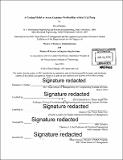A costing model to assess customer profitability within Li & Fung
Author(s)
Semko, David A
DownloadFull printable version (5.324Mb)
Other Contributors
Leaders for Global Operations Program.
Advisor
David Simchi-Levi and Charles Fine.
Terms of use
Metadata
Show full item recordAbstract
As the leading consumer goods design, development, sourcing and logistics company, Li & Fung Limited (Li & Fung) supplies high-volume, time-sensitive consumer goods for global retailers and brands. One of Li & Fung's strengths is its diverse operational network; the company sources from over 15,000 suppliers and operates in over 40 global economies. However, Li Fung is also faced with unique challenges in a constantly evolving business environment. Many of these challenges are linked to the ever-increasing demands of customers (and end consumers) in a consumer-centric industry that has seen margins fall significantly. A dynamic costing model is developed to better understand profitability at the customer level within Li and Fung. Historically, gross margins have been a sufficient measure of customer profitability. With a variety of factors causing margins to decrease throughout the fashion industry combining with an increase in variation in the level of service required by customers, gross margins are no longer a reliable means of assessing customer profitability. The research examines the current process for managing customer orders within a product group with a principal-based business model via a series of interviews with employees in various functional roles. The cost-modeling proceeded by creating a cost allocation model that allocates product development and operating costs to customers on the basis of their utilization of resources. The model provides both individualized income statements for each customer as well as an aggregated view of customer profitability for the entire product group. The model is demonstrated with one medium-sized product group using data from calendar year 2014. Recommendations and opportunities for follow-on research and extensions are discussed.
Description
Thesis: M.B.A., Massachusetts Institute of Technology, Sloan School of Management, 2016. In conjunction with the Leaders for Global Operations Program at MIT. Thesis: S.M. in Engineering Systems, Massachusetts Institute of Technology, School of Engineering, Institute for Data, Systems, and Society, 2016. In conjunction with the Leaders for Global Operations Program at MIT. Cataloged from PDF version of thesis. Includes bibliographical references (pages 57-58).
Date issued
2016Department
Leaders for Global Operations Program at MIT; Massachusetts Institute of Technology. Engineering Systems Division; Massachusetts Institute of Technology. Institute for Data, Systems, and Society; Sloan School of ManagementPublisher
Massachusetts Institute of Technology
Keywords
Sloan School of Management., Institute for Data, Systems, and Society., Engineering Systems Division., Leaders for Global Operations Program.